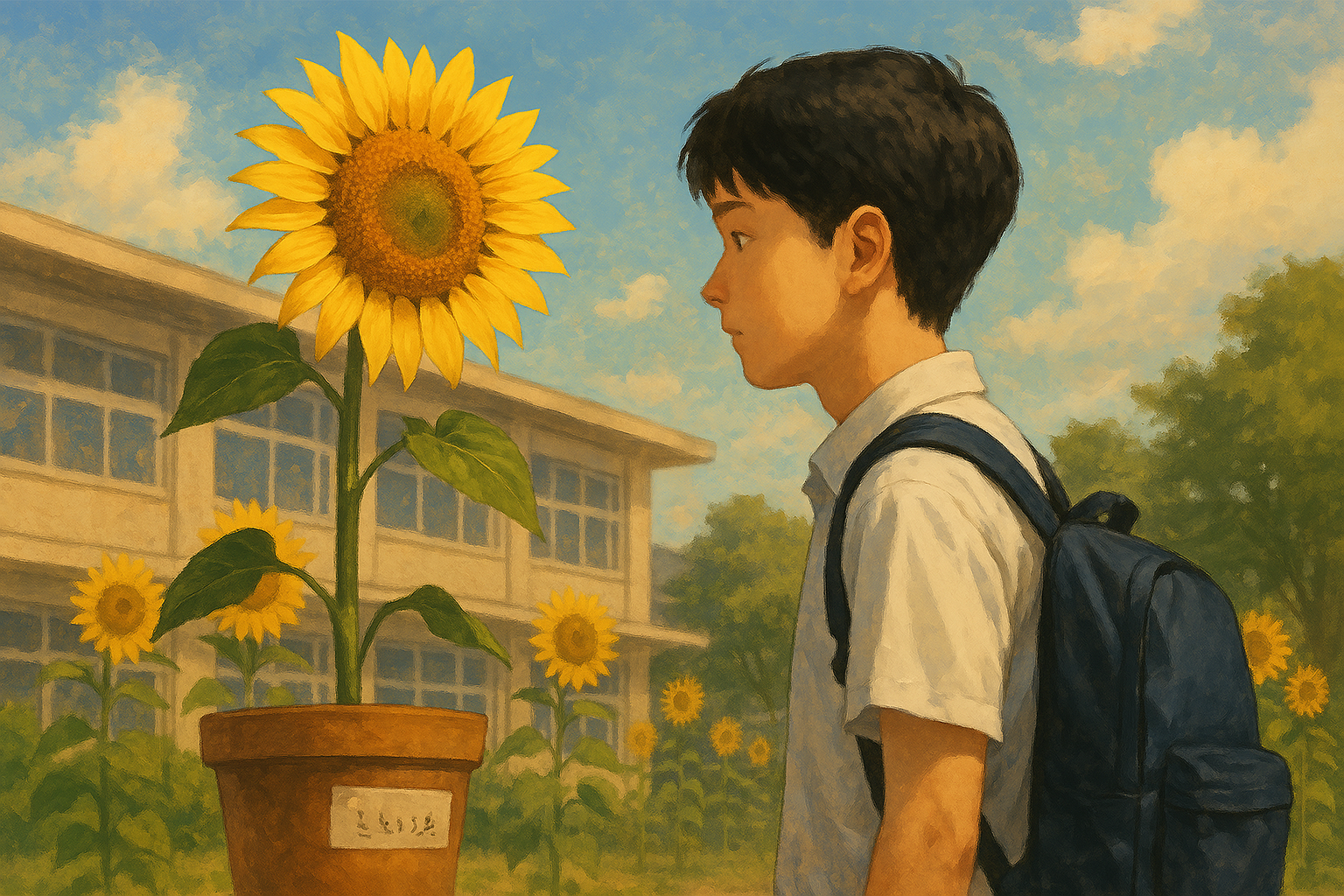随筆春秋「会員の部屋」
佐 藤 ゆ き
ひまわり
先日、息子が十八歳の誕生日を迎えた。
私は彼が生まれる前から、子供には日本人らしい日本語を使えるようになって欲しいと思っていた。夫はニューヨークの大学で一緒に映画を学んだアメリカ人で、日本語が苦手だ。アメリカで育つ息子には、英語が出来ない私の両親と話せるようになって欲しかった。そして何より、日本の素晴らしさを知るために、必要な日本語を身に付けて欲しかった。私はいつのころからか、彼の日本語がセンター試験を受けられるレベルに達することが目標なのだと吹聴するようになっていた。
だから私は、夫や日本語のわからない周囲の人たちが不愉快に思っても、息子とは日本語だけで会話した。どこかが痛いと言えば、それが「ズキズキ」なのか「チクチク」なのか問いただし、幼い息子を悩ませた。「パトカー」のような和製英語を多用し、「ヘリコプター」などのカタカナ英語はそのまま発音した。時には男言葉で話すこともあった。
四歳になると、毎週土曜日に日本語学校の幼児部に通わせた。お遊戯や言葉遊びを習い、息子は嬉々としてその成果を披露してくれた。
ところが、小学部に進学すると事態は一変した。大量の宿題に追われ、金曜日の夜は修羅場と化した。漢字ドリル一ページに九時間かかる日もあった。練習帳は涙で濡れ、何度も書き直すので、歪んでボロボロになった。
しかし、いくら頑張ってもアメリカ育ちの子供たちは、集まるとつい英語で話し始めてしまう。これは危ういと思い調べてみると、日本の公立小学校には、一時帰国中の生徒を受け入れる制度があることがわかった。役所と学校に連絡をして、六月末、私たちはニューヨークの学校が夏休みに入ると同時に帰国した。
約束の朝、実家から徒歩三分の小学校に着くと、校長室へ案内された。そこで担任と対面し、教室へ向かった。担任は、ニューヨーク土産の小さなお菓子を、規則だからときっぱり断る新卒とおぼしき小柄の女性だった。
私たちが入ると、教室はざわめいた。そして、自己紹介を終えた息子が着席するや否や、皆が彼の机に群がった。子供たちの黒く小さな頭の隙間から見える彼の頬は紅潮し、その歓迎の儀式に戸惑いながらも嬉しそうだっだ。
夏休みが終わりニューヨークに戻ると、息子は「日本の小学校に行って来たんだぞ、すごいだろ」と言わんばかりに、なんとなく態度が大きくなっていた。
その年の日本語学校の文集の作文は、夏の思い出一色だった。テーマは日本語学校での出来事であるべきなのに、作文のタイトルが日本の小学校の名前だった。
新しくできた友達と給食当番になれたこと。給食で一番おいしかったのは、鰻ごはんとそうめんだったこと。ニューヨークと違い、学校へは子供だけで歩いて行ったこと。プールの授業は嫌だったけれど、一人で着替えてシャワーを浴びたこと。とにかく、日本の小学校がいかにすごいところだったかと延々と綴られ、「また行きたい」と結んであった。
彼の日本語がかろうじて学齢相応だったのは、他でもない日本語学校のおかげなので、私は申し訳ない気持ちになった。しかし、その一方で、これは大成功だったと確信した。
翌年の夏、私たちは再び小学校を訪れた。
正門をくぐると、息子に気付いた生徒たちが次々と声をかけてくれた。校長室で前年の担任と再会し、繰り上がった同じ組に入ると知った息子はほっとした様子だった。
息子には心配ごとがあった。日本語学校の宿題のひとつ、ひまわりの観察日記のことだ。ひまわりを日本に持ち込むことはできず、日記は途中までしか書けていなかった。そこで、何か育てていたら、誰かのものを見せてもらえないかと尋ねると、担任は答えた。
「あの、もうあるんです。今年も来てくれたらいいね、ってみんなで話していたんですよ」
聞けば花壇には、他の生徒のものに混じって息子のひまわりの鉢があるという。クラスのみんなが当番制で水やりをしてくれたお陰で、元気に育っているらしかった。
私は驚きと嬉しさのあまり言葉を失い、隣でぼんやりしている息子の方を向いた。若い先生のくったくのない笑顔を見ながら、私のようなおばさんが涙ぐんではバツが悪いので、とっさに顔を背けてしまったのだった。促されるままに校庭に出ると、息子のかすれた名入りのひまわりが、たくさんのひまわりの中で咲いていた。
その後も、息子は毎年夏になると、この学校に通った。子供たちは、最後の日が来ると、「来年もゼッタイに帰って来てね」と言って寂しそうに笑ってくれた。六年生の夏、息子はクラスメートお手製の立派な卒業証書を持ち帰り、それを見た私はしばし呆然とした。
二〇二一年、コロナ禍で、私たち親子は夫をニューヨークに残して帰国した。息子は公立中学校へ転入後、高校受験を経て、現在は主要科目を英語で受けられる高校に通っている。日本語は問題なく使うことができるが、英語力が圧倒的に優り、お小遣いの大半を洋書専門店と名画座で使ってくる。海外の大学で学ぶことを希望しており、センター試験を受ける気も、その実力もないようだ。
……はて。なぜ私はセンター試験にこだわったんだっけ。私だって受けたことがないのに。私の本当の夢は、彼が習得した日本語を使い、日本の素晴らしさを知ることだったはずだ。
振り返れば、息子は幾度となく言っていた。
「日本はすごい!」

Sunflower
My son turned eighteen.
I met my husband in New York, where he had spent his whole life. Although he tried hard, learning Japanese never came easily to him.
We had decided to raise our son in New York and, even before he was born, I had hoped my child would grow up at least somewhat fluent in Japanese. I wanted him to be able to communicate naturally with my parents, who didn’t speak English. More than anything, I wanted him to develop enough Japanese to truly appreciate the depth and richness of Japanese culture and heritage.
Along the way, I found myself saying that my goal was for his Japanese to be good enough to take the National Center Test for University Admissions.
So, despite how awkward or uncomfortable it might have been for my husband and others around us who didn’t understand Japanese, I always spoke to my son only in Japanese—and insisted that he speak Japanese back to me. If he said something hurt, I pressed him to explain whether it was a throbbing pain or a stinging one, pestering him with these kinds of questions. I often used Japanese words derived from foreign languages—patokaa (patrol car), for example—and pronounced katakana English words like herikoputaa (helicopter) just as a native Japanese speaker would. At times, I even slipped into a masculine tone of speech.
When he turned four, I enrolled him in a Japanese Saturday kindergarten class. He learned through play and word games and, with pride and joy, he would put on little performances for me and my husband at home.
But things changed when he moved up to elementary school. The sheer volume of homework became overwhelming, and Friday nights turned into nightmares. Some days, it would take him nine hours just to finish a single page of kanji drills. Tears often soaked his workbook. After many revisions, the pages became torn and wrinkled.
No matter how hard he tried, whenever the Japanese kids raised in the U.S. gathered at school, they would always end up speaking English. I worried this would hinder his Japanese development—as I had seen happen with many immigrant children. After some research, I learned that Japanese public schools have a system for accepting students who are temporarily returning to Japan. I contacted the city office of my hometown and the local school, and at the end of June—just as his school in New York was beginning summer break—we returned to Japan.
On the scheduled day, we arrived at the elementary school, just a three-minute walk from my parents’ house, and were escorted to the principal’s office. There, we met his homeroom teacher and headed to the classroom together. She was a young, petite woman who looked like she had just graduated from college. She politely declined the small souvenirs from New York that I had carefully chosen, explaining that it was against the rules. When we entered the classroom, the students started buzzing with excitement. As soon as my son finished introducing himself and took his seat, all the kids gathered around his desk. I could see his flushed cheeks through the sea of little black-haired heads. Though he looked flustered by the warm welcome, he also seemed genuinely happy.
When summer break ended and we returned to New York, my son carried himself with a new sense of confidence, as if to say: I went to a Japanese elementary school. Pretty great, right?
That year, my son’s essay for the Japanese Saturday school’s annual collection was entirely about his summer experience in Japan. The theme was supposed to be about his time at the Saturday school, but the title of his essay was the name of the elementary school he attended in Japan. He wrote about being on lunch duty with his new friends, and how the best school lunch he had was eel rice and somen noodles. Unlike in New York, he walked to school alone. He didn’t enjoy swimming during P.E., but he managed to get changed and take a shower by himself. He went on and on about how unbelievably amazing Japanese elementary school was, and closed his essay by saying, “I wish I could go again next year.”
His genuine enthusiasm for attending school—and the complete absence of any mention of Japanese Saturday school —was a bit comical, but I felt grateful to Saturday school and the community he also had there. At the same time, I was convinced the experiment of attending school in Japan during the summer had been a huge success.
The following summer, we visited the same elementary school. As we passed through the main gate, some of the students spotted my son and greeted him. After meeting his homeroom teacher from the previous year in the principal’s office, my son looked relieved when he heard he would be placed in the same class.
But he had one concern: the sunflower observation diary assigned by his Japanese Saturday school. Since he hadn’t been able to bring his sunflower with him to Japan, he hadn’t continued writing in the diary. (This was a traditional summer science assignment that had existed since I was in elementary school.)
I asked the teacher if he could observe someone else’s sunflower instead, and she replied with a smile, “Actually, there’s already one waiting for him. We were hoping he’d come back this year.” I learned that in the school’s flowerbed, among all the other students’ sunflowers, there was one set aside for my son. The whole class had been watering it as part of their daily chores, and it was growing healthy and strong. I was so surprised and moved that I was speechless. I turned to look at my son, who was absentmindedly sitting beside me. Not wanting to embarrass myself in front of the young teacher’s innocent smile, I unconsciously turned my face away.
As we were guided out into the schoolyard, there it was—my son’s sunflower, blooming proudly in its pot with his faded name still on it, standing tall among all the others.
After that, my son continued attending the school every summer. On his last day each year, the children would smile sadly and say, “You MUST come back next year, OK?”
In the summer of his final year of elementary school, he came home with a beautifully crafted, handwritten diploma made by his classmates. When I saw it, I sank down onto the floor in a daze.
In 2021, during the pandemic, my son and I returned to Japan, leaving my husband behind in New York. My son transferred into a public junior high school, went through the high school entrance exams, and now attends a high school where most subjects are taught in English. His Japanese is fully functional, but his English ability far surpasses it. He spends most of his allowance at foreign-language bookstores and art house cinemas. He hopes to study abroad, and he shows little interest in—frankly, I’m not even sure he’s equipped to take—the National Center Test.
But why was I so fixated on that test in the first place? I never even took it myself. What I really wanted was for him to use his Japanese to understand how great Japan is.
Looking back, I realize he’s been saying it all along: “Japan is amazing, isn’t it?”

